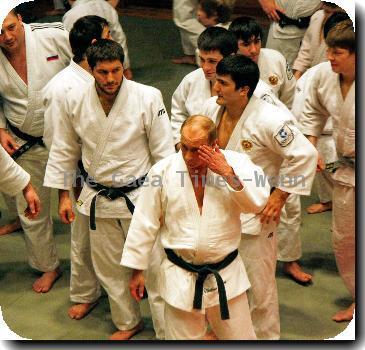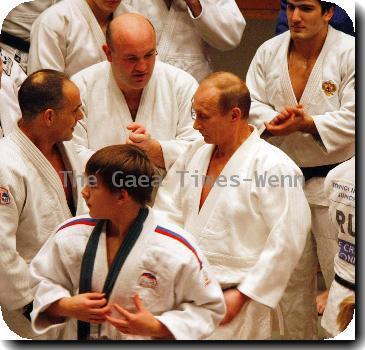Russia in mourning over 39 dead in Moscow blasts; jittery commuters return to subway
By Mansur Mirovalev, APTuesday, March 30, 2010
Russia mourns 39 dead in Moscow subway blasts
MOSCOW — Russians mourned the 39 people killed in a dual suicide attack on Moscow’s subway system by lighting candles and leaving carnations at one of the sites Tuesday, and officials called for a return of the death penalty to punish terrorists.
Monday’s attacks shocked a country that had grown accustomed to such violence being confined to a restive southern corner — and marked the return of terrorism to the everyday lives of Muscovites after a six-year break.
Many have speculated that the blasts — blamed on Muslim extremists in the Caucasus region, which includes Chechnya — were retaliation for the recent killing of separatist leaders in the area by Russian police.
Some lawmakers on Tuesday called for the return of capital punishment for convicted terrorists, and President Dmitry Medvedev in televised remarks called on judges to consider amending terrorism laws.
The city remained on edge, even as people began to commute on the subway again.
“I feel the tension on the metro. Nobody’s smiling or laughing,” said university student Alina Tsaritova, not far from the Lubyanka station, one of the targets.
The preliminary investigation found that female suicide bombers detonated belts of explosives during the Monday morning rush-hour at the stations.
Five people remain in critical condition out of 71 hospitalized after the blasts, city health department official Andrei Seltsovsky told the Rossiya-24 state news channel. Only eight victims had been formally identified, he said.
Some commuters said Tuesday they would try and block the events out of their mind completely.
“We have to live with this, not to think about it, especially when we’re underground,” said Tatyana Yerofeyeva, a Muscovite in her early 50s.
As public outrage swells, the upper house of parliament is proposing bringing back the death penalty for such crimes, a lawmaker was quoted as saying.
“This is our reaction to yesterday’s tragic events,” Anatoly Kyskov, the Federation Council’s legal committee chairman, said in comments carried by state news agency RIA Novosti.
Medvedev called on chairmen from the Supreme Court and the High Court of Arbitration to propose ways to “perfect” terrorism laws.
Russia announced a moratorium on capital punishment when it joined the Council of Europe in 1996 and pledged to abolish it, but has not done so. The Kremlin-controlled parliament has been reluctant to fully outlaw executions, due to broad public support for the death penalty.
As Moscow mourned, plastic plaques hung in the two metro stations above rickety tables overflowing with flowers; their inscriptions promised permanent replacements. Some people were choked by tears as they laid candles.
Flags flew at half staff on government buildings, at the Kremlin, and in other cities across the vast country. Entertainment events and television shows were canceled, and services were scheduled at several churches.
Heightened transportation security remained in effect across the capital and elsewhere. Police with machine guns and sniffer dogs patrolled subway entrances.
Later, jittery authorities evacuated 45 residents of a central Moscow apartment building over a suspicious-looking object found under a police vehicle nearby, Russian media said.
Monday’s first explosion took place just before 8 a.m. at the Lubyanka station in central Moscow, beneath the notorious headquarters of the Federal Security Service or FSB, the KGB’s main successor agency. The FSB is a symbol of power under Prime Minister Vladimir Putin, a former KGB officer who headed the agency before his election as president in 2000.
About 45 minutes later, a second blast hit the Park Kultury station on the same subway line, which is near the renowned Gorky Park. In both cases, the bombs were detonated as the trains pulled into the stations and the doors were opening.
Amateur video on Russian TV showed wounded and possibly dead commuters on the floor of the smoke-filled Lubyanka station. One video showed gruesome images of dead passengers sprawled inside a mangled subway car and a bloody leg lying on a station platform.
By late Monday, both stations had been scrubbed clean. Holes left by shrapnel in the granite were the only reminder of the day’s tragic bombings.
Putin, who built much of his political capital by directing a fierce war against Chechen separatists a decade ago, has promised to track down and kill the organizers of what he called a “disgusting” crime.
The ornate Moscow subway system is the world’s second-busiest after Tokyo’s, carrying around 7 million passengers on an average workday, and is a key element in running the sprawling and traffic-choked city.
The last confirmed terrorist attack in Moscow was in August 2004, when a suicide bomber blew herself up outside a subway station, killing 10 people. Chechen rebels claimed responsibility.
Dozens of contributors to three Web sites affiliated with al-Qaida wrote comments in praise of Monday’s attacks. One site opened a special page to “receive congratulations” for the Chechen rebels who “started the dark tunnel attacks in the apostate countries,” and wished for God to accept the two women as martyrs.
_____
Associated Press writer David Nowak contributed to this report.
Tags: Death Penalty Controversy, Eastern Europe, Europe, Moscow, Municipal Governments, Political Corruption, Political Issues, Russia, Terrorism, Vladimir Putin

